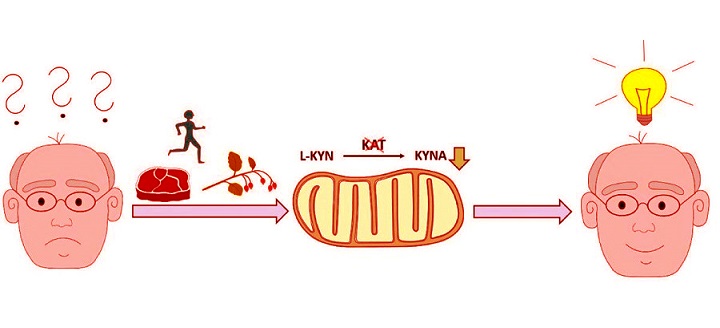Nikhil Prasad Fact checked by:Thailand Medical News Team Dec 20, 2024 3 months, 3 weeks, 3 days, 1 hour, 10 minutes ago
Medical News: A groundbreaking study has unveiled the potential of modulating kynurenine metabolism as a new avenue for treating dementia and memory-related conditions. Researchers from esteemed institutions across Europe explored the intricate relationship between the kynurenine pathway, a metabolic route of the amino acid tryptophan, and its effects on cognitive functions. The Karl Landsteiner Research Institute for Neurochemistry in Austria, University of Veterinary Medicine Vienna, and St. Francis Herbarium in Poland collaborated on this pioneering work.
 Novel Approach to Treat Dementia Via Modulating Kynurenine Metabolism
Understanding the Kynurenine Pathway
Novel Approach to Treat Dementia Via Modulating Kynurenine Metabolism
Understanding the Kynurenine Pathway
The kynurenine pathway is a biological process where tryptophan is broken down to produce various neuroactive compounds. Among these, kynurenic acid (KYNA) stands out due to its dual role in neurological health. Elevated levels of KYNA have been associated with impaired memory, while controlled reduction of its concentration has demonstrated improved cognitive functions.
This
Medical News report delves into the study's findings, highlighting how targeting this pathway offers hope for dementia therapy. The research underscores the importance of balancing KYNA levels, which may open pathways to new treatments for neurodegenerative diseases such as Alzheimer’s.
Key Findings of the Study
The researchers focused on the synthesis of KYNA from its precursor, L-kynurenine. In a healthy brain, KYNA regulates neurotransmitters by inhibiting specific receptor activities. However, an imbalance in KYNA levels can disrupt this equilibrium, leading to cognitive decline.
Key observations include:
-Enzymatic Activity: The study identified enzymes like kynurenine aminotransferases (KATs) responsible for KYNA synthesis. They noted variations in the activity of KATs in different brain regions, particularly in patients with Alzheimer’s and Down syndrome.
-Effects of KYNA Imbalance: Elevated KYNA levels were found in patients suffering from dementia, schizophrenia, and Huntington’s disease. These elevations correlated with disruptions in neurotransmitter systems, such as glutamate and acetylcholine, critical for learning and memory.
-Experimental Models: The team employed a novel memory model using the snail Helix pomatia to observe KYNA's impact across species. Findings confirmed that reducing KYNA levels improved cognitive functions.
Therapeutic Approaches and Natural Interventions
The research explored pharmacological interventions and natural remedies to regulate KYNA metabolism. Drugs like D-cycloserine and cerebrolysin showed promise in clinical trials. These compounds were found to inhibit KAT activity, reducing KYNA production and enhancing neurotransmitter function.
Natural interventions, including h
erbal medicines like Salvia officinalis (sage) and Jerusalem balsam, also demonstrated efficacy in modulating KYNA levels. These remedies could complement conventional treatments, offering a holistic approach to managing dementia.
Broader Implications
Beyond dementia, the findings have implications for other neurological and psychiatric disorders. Conditions like epilepsy, depression, and age-related cognitive decline might also benefit from therapies targeting the kynurenine pathway.
The study also highlighted lifestyle factors, such as diet and exercise, in maintaining balanced KYNA levels. Regular physical activity was shown to influence tryptophan metabolism positively, reducing KYNA accumulation and promoting overall brain health.
Conclusions
The study concludes that modulating the kynurenine pathway represents a promising strategy for dementia treatment. By targeting KYNA synthesis, researchers aim to restore the balance of neurotransmitters, thereby improving cognitive functions. This approach combines pharmacological innovation with natural therapies, paving the way for personalized treatment plans.
As the population ages, the burden of dementia continues to grow. The insights from this research offer a beacon of hope, suggesting that a deeper understanding of metabolic pathways can lead to effective therapies. Future studies will further explore these findings, aiming to refine treatment protocols and expand their applicability to other neurodegenerative diseases.
The study findings were published on a preprint server and are currently being peer reviewed.
https://www.preprints.org/manuscript/202410.1691/v1
For the latest on Dementia, keep on logging to Thailand
Medical News.
Read Also:
https://www.thailandmedical.news/news/british-study-finds-that-60-percent-of-individuals-aged-60-above-exposed-to-sars-cov-2-will-develop-dementia
https://www.thailandmedical.news/news/medical-news-scientists-discover-protein-called-taf15-that-causes-early-onset-dementia
https://www.thailandmedical.news/articles/alzheimer,-dementia-
